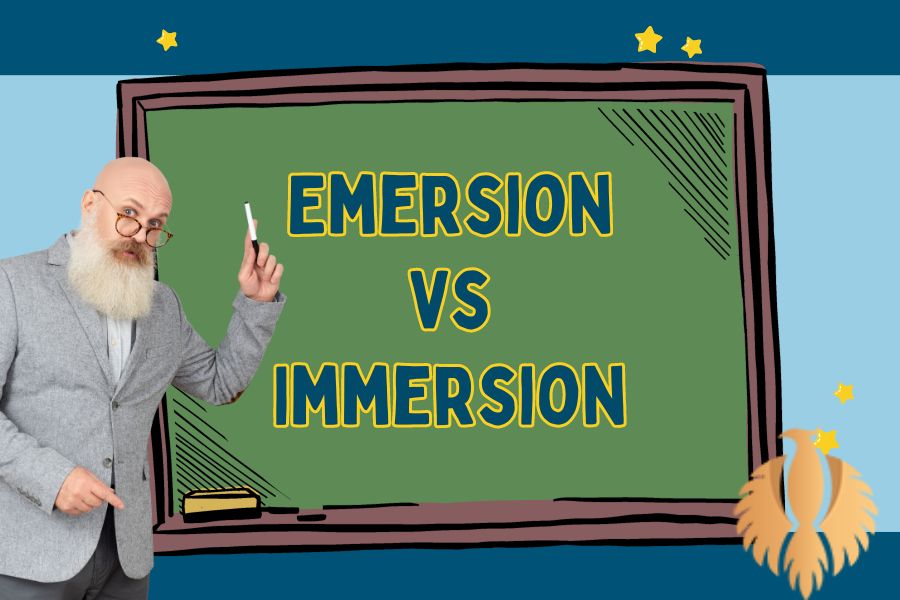
Here are five key points that highlight the differences between “emersion” and “immersion”:
- Definitions: “Immersion” refers to the state of being deeply engaged or submerged in a particular environment or activity, often used in contexts like language learning or cultural experiences.
“Emersion,” on the other hand, involves the process of emerging or coming out of a submerged state, which is less commonly used.
- Contextual Usage: “Immersion” is frequently associated with educational methodologies, particularly in learning languages or cultures, where individuals completely experience the target language or culture. Conversely, “emersion” is often used in scientific or ecological contexts, referring to organisms coming out of a submerged or hidden state.
- Etymology: Both words have Latin origins; “immersion” comes from the Latin “immersio,” meaning “to plunge into,” while “emersion” derives from “emersio,” meaning “to bring out or rise.” This difference in origin highlights their contrasting meanings.
- Frequency of Use: “Immersion” is widely used across various fields such as education, psychology, and even art, while “emersion” is much less common and primarily used in specialized contexts like biology or geology.
- Examples in Sentences: In practical terms, you might say, “She achieved fluency through complete immersion in the language,” showcasing the active engagement. In contrast, “The emersion of the frog from the water signaled the start of its life on land,” illustrates the process of emerging.
Now, let’s explore these terms in more depth, identifying their nuances and applications across different contexts.
The English language is rich with words that may seem similar at first glance but carry unique meanings and implications when scrutinized closely.
Two such terms that often create confusion are “emersion” and “immersion.” As we advance into a more interconnected world in 2025, understanding the distinctions between terms like these becomes increasingly essential in effective communication, whether in academia, professional settings, or everyday life.
At the heart of our exploration lies “immersion,” a concept that embodies the idea of complete involvement or absorption in an activity or environment.
Whether it involves diving deep into a new language, culture, or art form, immersion denotes an active engagement that fosters a deeper understanding and connection to the subject matter.
This term is prevalent in educational contexts, particularly in language learning, where individuals are encouraged to immerse themselves completely to achieve fluency and comprehension.
In contrast, “emersion” refers to the process of emerging from a state of submersion. While this term may not be as widely recognized or used in daily conversation, it has significant implications in specific scientific and ecological contexts.
For instance, it describes the phenomenon when aquatic organisms, such as amphibians, come out of water, marking a transition that can be pivotal for their life cycle.
As we delve into the meanings, differences, and examples of “emersion” and “immersion,” we will dissect how each term functions within its respective context.
We will examine real-life scenarios and sentence constructions that offer clarity and insight into how to effectively incorporate these terms in both written and spoken language.
Additionally, we will explore the significance of understanding these linguistic subtleties, which can enhance your vocabulary and improve your ability to communicate nuanced ideas.
Our goal is to illuminate the distinctions between “immersion” and “emersion,” arming you with the tools necessary to navigate the complexities of language with confidence and precision.
Join us on this illuminating journey, where we will uncover the richness of these terms and their applications, thus enhancing your overall language skills and broader understanding of the world around you.
Emersion and immersion are two terms that are often used to describe different experiences or states of being.
In this article, we will explore the definitions of emersion and immersion, highlight their differences, and provide examples to illustrate each concept.
Emersion and immersion are two terms that describe different experiences or states of being, and while they may sound alike, they convey unique concepts that are significant in various fields, including education, technology, personal development, and environmental science.
Emersion is the process of coming out from a submerged state, originating from the Latin word “emersio,” which means “to rise out of.” This concept can be observed in both natural and metaphorical contexts.
For example, in marine biology, emersion refers to the moment when a marine organism, like a fish or seaweed, surfaces from the water.
Metaphorically, emersion can describe a person emerging from a period of deep contemplation, reflection, or a tough phase in life, indicating a shift from being hidden or deeply involved to becoming visible and active once more.
In contrast, immersion involves being deeply engaged or involved in a specific activity or environment.
The term comes from the Latin “immersio,” meaning “to dip into.” Immersion is often used to describe experiences where individuals are fully absorbed, often losing track of time and their surroundings.
This idea is prevalent in educational contexts, where immersive learning techniques encourage students to engage deeply with the material through hands-on activities, simulations, or virtual reality experiences.
Immersion is also crucial in technology, especially in virtual reality (VR) and augmented reality (AR), where users find themselves in simulated environments that feel authentic and captivating.
The distinctions between emersion and immersion are quite important and can be demonstrated through various scenarios.
In a learning environment, immersion could refer to a student engaging in a language immersion program, where they are surrounded by the language they are studying, using it in daily interactions to boost their fluency.
Emersion, in this context, would signify the moment the student exits this immersive setting and starts to utilize their newly learned language skills in real-life situations.
When it comes to personal growth, immersion might mean someone fully committing to a new hobby or skill, like painting or playing an instrument, dedicating hours to practice and refine their craft.
Emersion, then, would be the moment they step out of this focused practice, ready to display their abilities or incorporate their new skills into everyday life.
In the field of environmental science, immersion can refer to being submerged in water, such as a coastal region during high tide. On the other hand, emersion happens during low tide when the area is revealed, and the organisms that were once underwater become visible.
Grasping the ideas of emersion and immersion can greatly enhance our understanding of how we connect with our surroundings and experience different situations.
Whether in the realms of education, personal development, or environmental awareness, distinguishing between these two states allows us to better appreciate the richness and intricacy of our interactions and transitions.
In this article, we will define emersion and immersion, outline their key differences, and provide examples to clarify each concept.
By examining these terms, we hope to deliver a thorough understanding that can be utilized in various fields and everyday life.
I trust this expanded introduction aligns with your expectations! If there are any specific aspects or extra information you’d like to add, just let me know.
You might also enjoy:Which of the Following: Definition + Complete Usage + Grammar
What is main differences of Emersion and Immersion
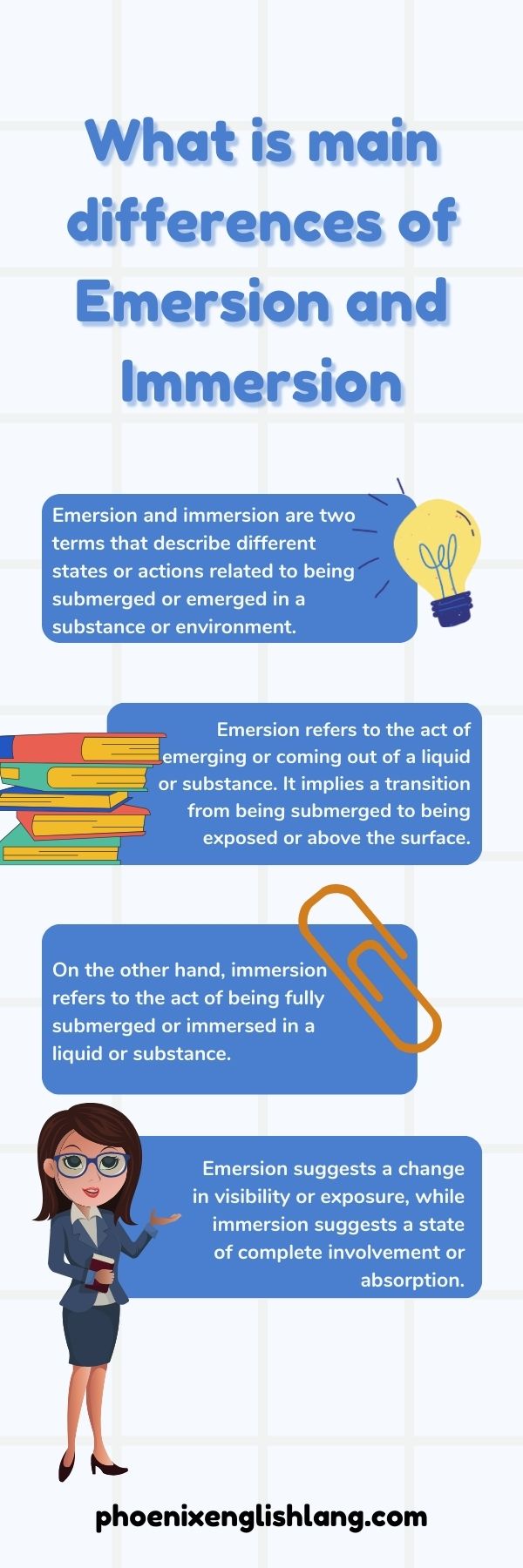
Emersion and immersion are two terms that describe different states or actions related to being submerged or emerged in a substance or environment.
Emersion refers to the act of emerging or coming out of a liquid or substance. It implies a transition from being submerged to being exposed or above the surface.
On the other hand, immersion refers to the act of being fully submerged or immersed in a liquid or substance.
It implies a state of being completely surrounded or covered by the substance. In summary, emersion describes the action of coming out of a substance, while immersion describes the state of being fully submerged in a substance.
While both emersion and immersion involve a transition or involvement, they differ in their focus and implications.
Emersion emphasizes the act of emerging or coming out of something, while immersion emphasizes the state of being deeply engaged or absorbed in something.
Emersion suggests a change in visibility or exposure, while immersion suggests a state of complete involvement or absorption.
You Might Also Enjoy:Reinforce Vs Reenforce: 10 Differences + Examples [2025]
20 Key Distinctions Between Emersion and Immersion
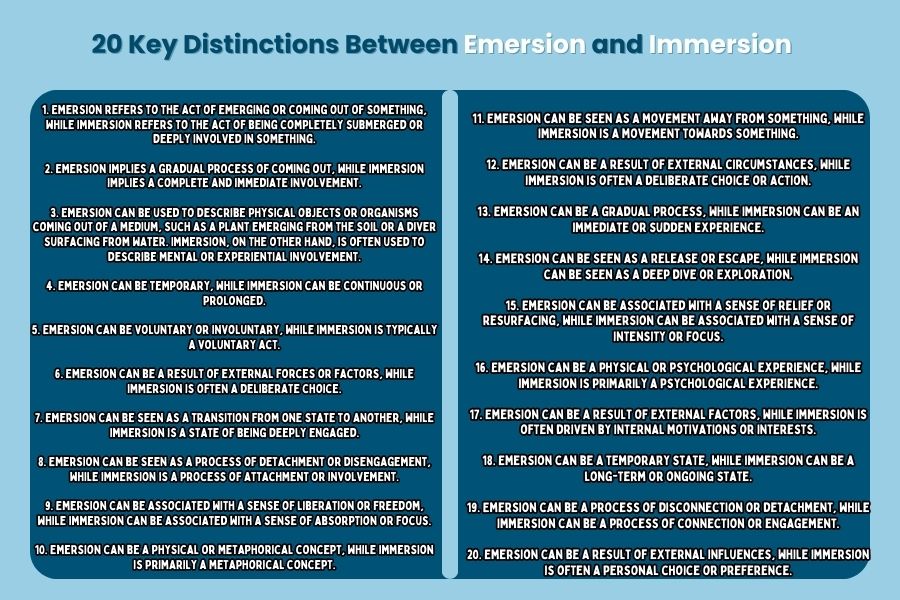
1. Emersion refers to the act of emerging or coming out of something, while immersion refers to the act of being completely submerged or deeply involved in something.
2. Emersion implies a gradual process of coming out, while immersion implies a complete and immediate involvement.
3. Emersion can be used to describe physical objects or organisms coming out of a medium, such as a plant emerging from the soil or a diver surfacing from water. Immersion, on the other hand, is often used to describe mental or experiential involvement.
4. Emersion can be temporary, while immersion can be continuous or prolonged.
5. Emersion can be voluntary or involuntary, while immersion is typically a voluntary act.
6. Emersion can be a result of external forces or factors, while immersion is often a deliberate choice.
7. Emersion can be seen as a transition from one state to another, while immersion is a state of being deeply engaged.
8. Emersion can be seen as a process of detachment or disengagement, while immersion is a process of attachment or involvement.
9. Emersion can be associated with a sense of liberation or freedom, while immersion can be associated with a sense of absorption or focus.
10. Emersion can be a physical or metaphorical concept, while immersion is primarily a metaphorical concept.
11. Emersion can be seen as a movement away from something, while immersion is a movement towards something.
12. Emersion can be a result of external circumstances, while immersion is often a deliberate choice or action.
13. Emersion can be a gradual process, while immersion can be an immediate or sudden experience.
14. Emersion can be seen as a release or escape, while immersion can be seen as a deep dive or exploration.
15. Emersion can be associated with a sense of relief or resurfacing, while immersion can be associated with a sense of intensity or focus.
16. Emersion can be a physical or psychological experience, while immersion is primarily a psychological experience.
17. Emersion can be a result of external factors, while immersion is often driven by internal motivations or interests.
18. Emersion can be a temporary state, while immersion can be a long-term or ongoing state.
19. Emersion can be a process of disconnection or detachment, while immersion can be a process of connection or engagement.
20. Emersion can be a result of external influences, while immersion is often a personal choice or preference.
30 points about Emersion and Immersion
Emersion refers to the emergence or rising out of something, while immersion refers to total involvement or complete absorption in something.
Emersion involves coming out of or emerging from a state or situation, while immersion involves being fully engaged or completely immersed in an activity or experience.
Emersion can refer to the act of emerging from water or another substance, while immersion can refer to being fully submerged in a fluid or immersed in an experience.
Emersion can also refer to the act of emerging or rising above a surface, while immersion can refer to being deeply involved or engrossed in a particular activity or situation.
Emersion can signify the act of coming out of a difficult or challenging situation, while immersion can denote being fully immersed in a sensory experience or virtual reality.
Emersion can imply a process of gradually emerging or becoming more visible or noticeable, while immersion can imply a state of being completely surrounded or enveloped by an experience or environment.
Emersion can be seen as a process of revealing or making something visible or apparent, while immersion can be seen as a state of being fully absorbed or engrossed in a particular activity or environment.
Emersion can symbolize a transition from one state to another, such as coming out of a cocoon as a butterfly, while immersion can symbolize a deep dive into a specific topic, culture, or experience.
Emersion can represent a moment of clarity or realization after a period of obscurity or confusion, while immersion can represent a state of deep focus and intense concentration on a task or activity.
Emersion can suggest a process of resurfacing or emerging from a period of isolation or seclusion, while immersion can suggest a state of complete engagement or involvement in a particular interest or pursuit.
Emersion can connote a sense of renewal or transformation after a period of introspection or reflection, while immersion can connote a sense of deep connection or absorption in a meaningful experience.
Emersion can evoke a sense of breaking free from constraints or limitations, while immersion can evoke a sense of being fully present and engaged in the present moment.
Emersion can symbolize a journey of self-discovery or personal growth, while immersion can symbolize a journey of deep learning or exploration.
Emersion can represent a process of coming into focus or becoming more clearly defined, while immersion can represent a state of complete involvement or absorption in a specific task or activity.
Emersion can signify a transition from a state of ignorance or unawareness to a state of understanding or enlightenment, while immersion can signify a state of being fully engaged or absorbed in a particular experience or environment.
Emersion can signify a moment of emergence or revelation, while immersion can signify a state of complete immersion or absorption in an experience.
Emersion can evoke a sense of emergence or rising to the surface after a period of obscurity or concealment, while immersion can evoke a sense of complete immersion or absorption in a particular activity or environment.
Emersion can represent a process of coming into view or becoming more apparent or visible, while immersion can represent a state of total immersion or absorption in a sensory experience or virtual reality.
Emersion can symbolize a moment of emergence or rising out of a difficult or challenging situation, while immersion can symbolize a state of complete involvement or absorption in a specific activity or experience.
Emersion can suggest a process of emergence or coming into being, while immersion can suggest a state of being fully absorbed or engrossed in a particular task or experience.
Emersion can connote a sense of emergence or rising to the surface after a period of concealment or hiddenness, while immersion can connote a state of complete immersion or absorption in a particular interest or pursuit.
Emersion can evoke a sense of emergence or coming forth after a period of withdrawal or retreat, while immersion can evoke a sense of being fully present and engaged in the moment.
Emersion can symbolize a process of emergence or rising out of a state of dormancy or inactivity, while immersion can symbolize a state of complete involvement or absorption in a meaningful experience.
Emersion can signify a transition from a state of dormancy or hibernation to a state of activity or engagement, while immersion can signify a state of being fully engaged or absorbed in a specific task or activity.
Emersion can represent a process of emergence or coming to the forefront after a period of latency or dormancy, while immersion can represent a state of complete immersion or absorption in a particular experience or environment.
Emersion can evoke a sense of emergence or rising from a state of confinement or restriction, while immersion can evoke a sense of complete immersion or absorption in a sensory experience or virtual reality.
Emersion can connote a process of emergence or becoming more visible or apparent, while immersion can connote a state of being fully absorbed or engrossed in a particular activity or situation.
Emersion can symbolize a moment of emergence or revelation after a period of concealment or obscurity, while immersion can symbolize a state of complete immersion or absorption in a specific task or experience.
Emersion can suggest a process of emergence or coming to light after a period of darkness or confusion, while immersion can suggest a state of being fully absorbed or engrossed in a particular interest or pursuit.
Emersion and immersion both involve a sense of transitioning or moving from one state to another, with emersion focusing on coming out of a state or situation, while immersion focuses on being deeply involved or absorbed in an experience or activity.
You might also enjoy:Where Does “How is your Day Going?” Originate From?
Emersion
The term “emersion” denotes the action of emerging, ascending, or emerging from a submerged or concealed condition.
It has the capacity to be employed in both the literal and the metaphorical contexts.
In the realm of nature, emersion commonly characterizes the procedure of emerging from water or another medium, such as the ascension of aquatic organisms to the surface of the water or the emergence of plant shoots from the ground.
From a metaphorical standpoint, emersion may exemplify the act of triumphing over obstacles, liberating oneself from constraints, and transcending adversity.
Moreover, “cultural emersion” alludes to the complete immersion in a foreign culture or environment, while “emersion therapy” encompasses the practice of immersing oneself in nature as a strategy for promoting relaxation and mental revival.
Ultimately, emersion encompasses the notion of emergence, development, and metamorphosis in diverse contexts.
Point:
It implies a transition from a submerged or hidden state to a visible or exposed state. Emersion can be used to describe various situations where something or someone becomes apparent or emerges from obscurity. For example:
“The artist’s emersion from a period of creative block led to a burst of new artwork.”
You might also enjoy:Interested In or On: The Differences + Examples [2025]
20 examples for Emersion

1. The swimmer experienced a complete emersion in the pool as they dove into the water.
2. The hiker felt a sense of emersion as they immersed themselves in the beauty of nature.
3. The artist found emersion in their painting, losing track of time as they focused on their creative process.
4. The reader experienced emersion in the captivating world of a novel, getting lost in the story.
5. The musician felt a deep emersion in their music, pouring their emotions into each note.
6. The chef found emersion in the art of cooking, experimenting with flavors and techniques.
7. The meditator achieved a state of emersion, fully immersing themselves in the present moment.
8. The dancer felt a sense of emersion as they moved gracefully across the stage, fully absorbed in their performance.
9. The photographer experienced emersion in capturing the perfect shot, focusing on composition and lighting.
10. The athlete felt a sense of emersion during intense training sessions, pushing their limits and focusing on their performance.
11. The traveler found emersion in exploring new cultures, immersing themselves in the local customs and traditions.
12. The scientist experienced emersion in their research, delving deep into their studies to uncover new discoveries.
13. The writer felt a sense of emersion as they crafted a compelling story, getting lost in the world they were creating.
14. The gardener found emersion in tending to their plants, nurturing them and watching them grow.
15. The student experienced emersion in their studies, fully engaging with the material and seeking knowledge.
16. The actor felt a sense of emersion on stage, fully embodying their character and connecting with the audience.
17. The yoga practitioner achieved emersion in their practice, focusing on breath and movement to find inner peace.
18. The historian found emersion in studying the past, uncovering the intricacies of different time periods.
19. The puzzle enthusiast experienced emersion in solving complex puzzles, challenging their mind and problem-solving skills.
20. The video gamer felt a sense of emersion in virtual worlds, fully engaging with the game and its storyline.
Immersion
Immersion, in my opinion, is a transformative experience that allows me to fully immerse myself in a new environment or activity. It is like diving headfirst into a pool of knowledge and culture, embracing every aspect of it. In my classes, I often emphasize the importance of immersing oneself in a subject to truly understand and appreciate it.
You might also enjoy:What Kind of Vs What Kinds of – Differences + Examples [2025]
Immersive Learning: Diving Deep into the World of Knowledge
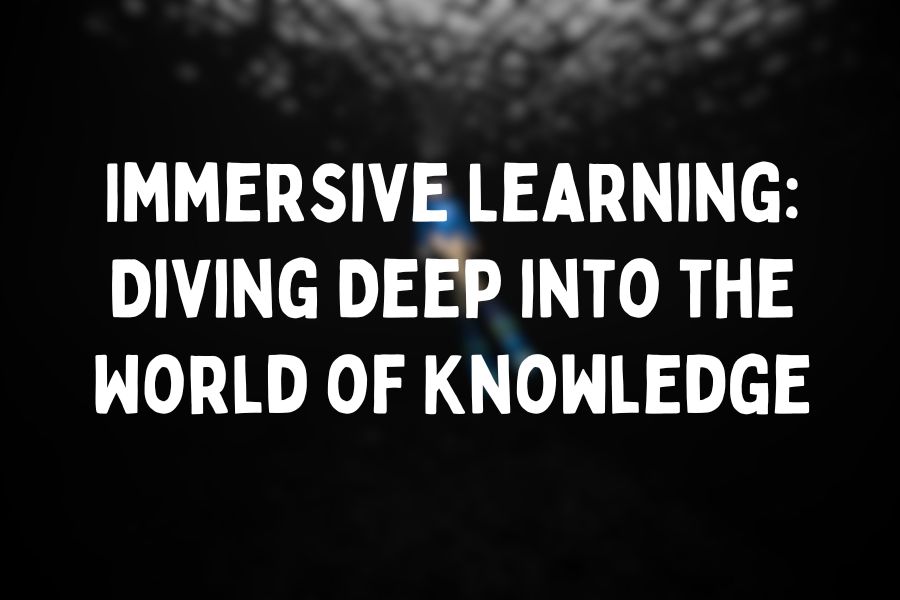
When I immerse myself in something, I become fully engaged and absorbed in the experience. It’s like stepping into a different world, where my senses are heightened, and my focus is laser-sharp. I encourage my students to do the same, to dive deep into their studies and explore every facet of the subject matter.
You might also enjoy:Too Cute Meaning Vs To Cute (To Vs Too) + Examples
Embracing Novelty and Curiosity: Unleashing the Power of Immersive Learning
During immersion, I find myself surrounded by new sights, sounds, and sensations. It’s as if I am transported to a different reality, where everything is fresh and exciting. I encourage my students to embrace this sense of novelty and curiosity, to approach their learning with an open mind and a willingness to explore the unknown.
Enhancing Immersion: The Power of Active Observation
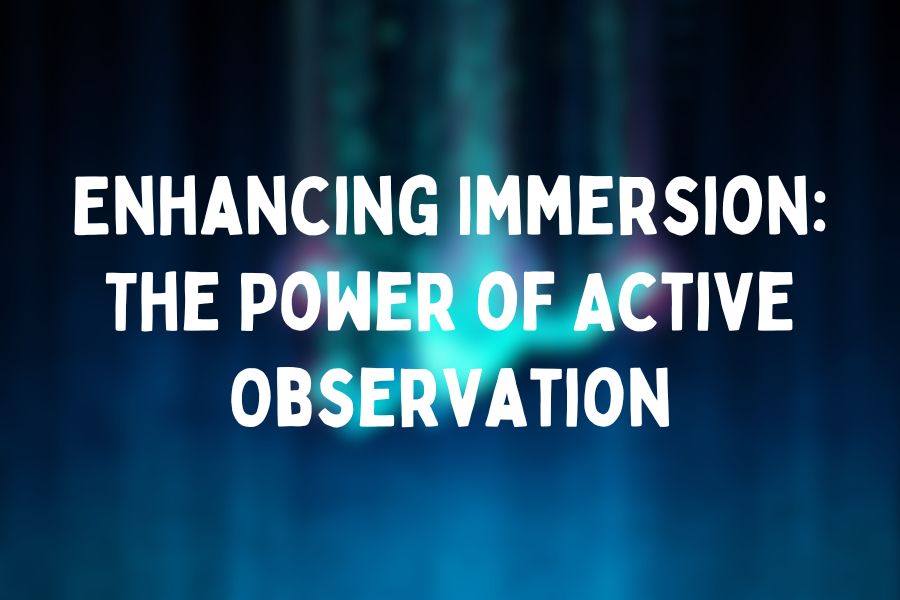
In my classes, I often teach techniques to enhance immersion. One such technique is active observation.
By actively observing my surroundings, I can pick up on subtle details and nuances that might otherwise go unnoticed. This allows me to gain a deeper understanding and appreciation of the subject at hand.
Active Participation: Unlocking the Full Potential of Immersive Learning
Another technique I teach is active participation. Immersion is not a passive experience; it requires active engagement and involvement.
By actively participating in discussions, hands-on activities, or real-world applications, I can fully immerse myself in the subject matter.
I encourage my students to do the same, to actively participate in their learning journey and take ownership of their education.
Language Immersion: Unlocking New Worlds and Cultural Connections
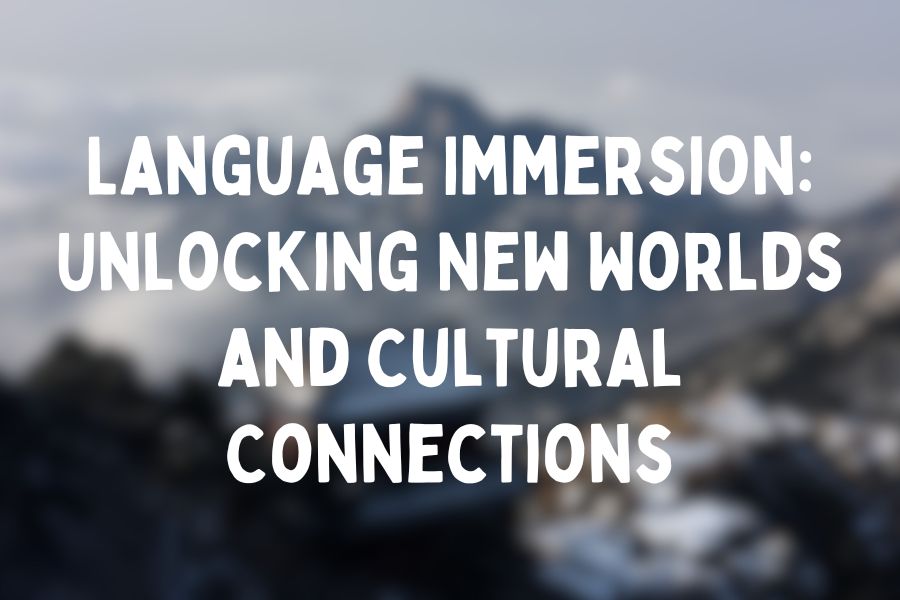
Immersion also involves embracing the language and culture associated with the subject.
Language is a powerful tool that can unlock new worlds and perspectives. In my classes, I emphasize the importance of language immersion, whether it’s through reading, listening, or conversing.
By immersing oneself in the language, one can gain a deeper understanding of the subject matter and connect with its cultural context.
You might also enjoy:How Are You Fairing or Faring? Differences + Examples
The Power of Immersion: Embracing Active Engagement for Deeper Learning and Appreciation
In conclusion, immersion is a transformative experience that allows me to fully engage and absorb myself in a new environment or activity.
It involves active observation, active participation, and embracing the language and culture associated with the subject.
Through immersion, I can dive deep into the pool of knowledge and emerge with a richer understanding and appreciation.
In my classes, I encourage my students to embrace immersion and approach their learning with curiosity, openness, and active engagement.
Point:
It implies a complete involvement or immersion in an activity, environment, or experience.
Immersion often suggests a sense of being fully immersed or surrounded by a particular subject or context. Here are a few examples:
“The students’ immersion in a foreign language program greatly improved their language skills.”
20 examples for Immersion

1. Language immersion programs provide students with an immersive environment to learn a new language.
2. Virtual reality technology allows users to experience immersion in a simulated environment.
3. A deep-sea diving experience offers immersion into the underwater world.
4. Cultural immersion programs allow individuals to fully immerse themselves in a different culture.
5. Reading a captivating novel can provide a sense of immersion in the story.
6. Attending a live concert can create a sense of immersion in the music.
7. Virtual reality gaming provides players with an immersive gaming experience.
8. Participating in a cooking class can offer immersion in a different culinary tradition.
9. Watching a movie in a theater with surround sound can create an immersive cinematic experience.
10. Going on a safari allows individuals to immerse themselves in the natural habitat of wild animals.
11. Taking part in a meditation retreat offers an immersive experience in mindfulness and self-reflection.
12. Visiting a historical site can provide an immersive understanding of the past.
13. Joining a theater production allows actors to immerse themselves in their characters.
14. Attending a sports event can create an immersive atmosphere of excitement and camaraderie.
15. Exploring a foreign city on foot allows for an immersive cultural experience.
16. Participating in a virtual reality art exhibit offers an immersive journey into the world of art.
17. Going on a hiking trip in a national park provides an immersive experience in nature.
18. Attending a language exchange meetup allows individuals to immerse themselves in practicing a foreign language.
19. Taking part in a yoga retreat offers an immersive experience in yoga practice and relaxation.
20. Joining a guided tour of a museum provides an immersive learning experience about art and history.
You Might Also Enjoy: Top 60 Most Common Simple Sentences In English
Frequently Asked Questions
1. What is the meaning of emersion and immersion?
Emersion refers to emergence or rising out of something, while immersion refers to total involvement or complete absorption in something.
2. What are the key differences between emersion and immersion?
Emersion involves coming out of a state or situation, while immersion involves being fully engaged in an activity or experience.
3. Can you provide examples of emersion in everyday life?
An example of emersion could be a caterpillar undergoing metamorphosis and emerging as a butterfly.
4. How about examples of immersion in daily experiences?
An example of immersion could be getting lost in a good book or being fully engrossed in a video game.
5. How do emersion and immersion differ in their psychological implications?
Emersion can symbolize a sense of renewal or transformation, while immersion can signify deep focus and intense concentration.
6. In terms of personal development, how can emersion and immersion be applied differently?
Emersion may involve emerging from a challenging situation, while immersion may involve deep learning or exploration in a specific area.
7. How do emersion and immersion relate to the concept of mindfulness?
Emersion could symbolize a moment of clarity or realization, while immersion could represent being fully present and engaged in the moment.
8. Can you provide a spiritual interpretation of emersion versus immersion?
Emersion could symbolize a journey of self-discovery, while immersion could represent a deep connection or absorption in a meaningful experience.
9. How do emersion and immersion impact our overall perception of the world?
Emersion may bring about a moment of emergence or revelation, while immersion may create a sense of complete absorption in a particular experience.
10. Are there specific aspects of life where emersion is more beneficial than immersion, and vice versa?
Emersion may be beneficial for overcoming challenges or obstacles, while immersion may be useful for deepening understanding or skills in a particular area.
Conclusion
To sum up, emersion and immersion are two separate ideas that carry different meanings and implications.
Emersion is the process of coming out or emerging from something, while immersion describes a state of being fully engaged or absorbed in an activity.
Recognizing these distinctions can enhance our ability to articulate and appreciate various experiences and situations.
Emersion often conveys a sense of change or evolution. It represents a shift from one condition to another, typically moving from a hidden or submerged state to one of visibility and action.
This idea can be applied in many scenarios. For instance, in nature, emersion can illustrate how a marine creature surfaces from the depths of the water.
On a more symbolic level, it can signify an individual emerging from a time of reflection or overcoming a difficult period in their life. Emersion is about rejoining the world with fresh insights, skills, or viewpoints.
Conversely, immersion refers to a profound level of engagement and participation. It describes a state where an individual is entirely engrossed in an activity, setting, or experience.
This state is often marked by a diminished awareness of time and surroundings, as one becomes singularly focused on the task at hand. The idea of immersion is commonly applied in educational and technological fields.
For example, immersive learning strategies encourage students to deeply connect with the material through hands-on activities, simulations, or virtual reality experiences.
In the tech world, immersion plays a crucial role in virtual reality (VR) and augmented reality (AR), where users find themselves in lifelike and captivating simulated environments.
The distinctions between emersion and immersion are quite notable and can be demonstrated through various scenarios.
In educational settings, immersion might look like a student engaging in a language immersion program, where they are enveloped by the language they are studying, using it in daily interactions to boost their fluency.
Emersion, in this context, would refer to the moment the student exits this immersive setting and starts applying their newly learned language skills in real-life situations.
In the area of personal growth, immersion could involve an individual fully committing to a new hobby or skill, such as painting or learning to play an instrument, dedicating hours to practice and refine their craft.
Emersion would then signify the moment they step back from this intense focus, prepared to display their abilities or incorporate their new skills into their everyday life.
In the field of environmental science, immersion refers to the condition of being fully submerged in water, like a coastal region during high tide.
On the other hand, emersion takes place during low tide when the area becomes exposed, revealing organisms that were once hidden beneath the water’s surface.
This natural rhythm of immersion and emersion plays a vital role in the survival of numerous marine species and the overall health of coastal ecosystems.
Grasping the ideas of emersion and immersion can offer valuable perspectives on how we interact with our surroundings and navigate various experiences.
Whether in learning, personal development, or environmental awareness, understanding these states can enhance our appreciation for the richness and intricacy of our interactions and transitions.
By recognizing when we are immersed or emerged, we can more effectively manage our time, attention, and energy, leading to more fulfilling and productive experiences.
In summary, emersion and immersion are not merely theoretical ideas but practical concepts that can enrich our understanding of different phenomena.
By delving into these terms and their relevance, we can cultivate a deeper appreciation for the ever-changing nature of our experiences and how we transition between different states of being.
Whether we are coming out of a reflective phase or diving into a new project, these concepts highlight the significance of balance and the ongoing relationship between engagement and emergence in our lives.

Hi, welcome to my blog! My name is Omid and I am thrilled to have you here! I am an English language teacher with 12 years of experience and hold multiple international certifications (TESOL, IELTS, TOEFL, PTE, CELTA). Additionally, I hold a PhD in Applied Linguistics with a specialization in Teaching English as a Second Language (TESL), which fuels my passion for teaching English and assisting others in mastering the language. To me, nothing is more rewarding than helping individuals enhance their English language abilities through various methods. So, let’s embark on this journey of learning English together.

